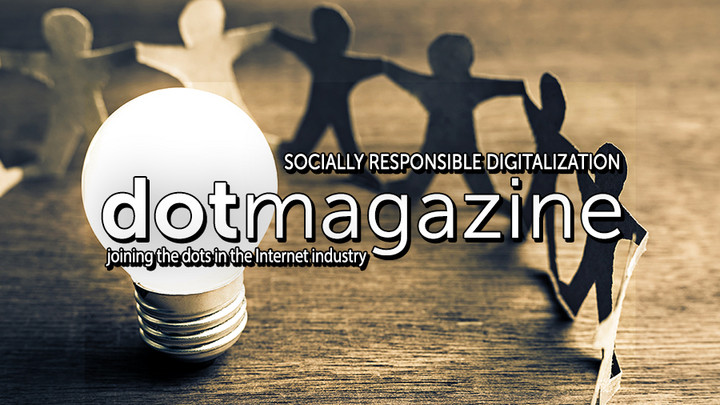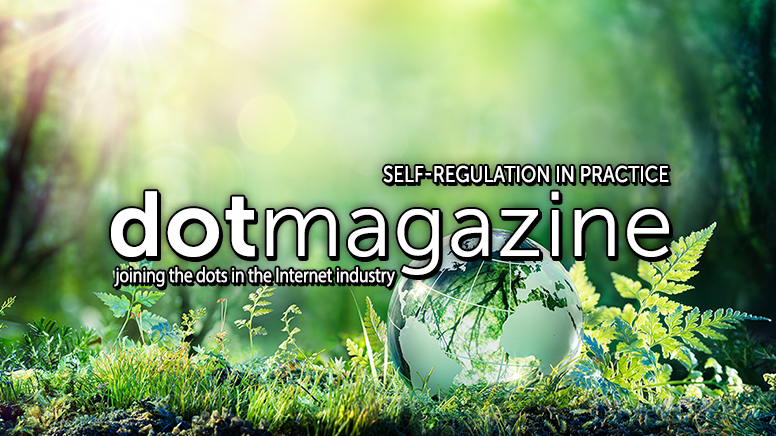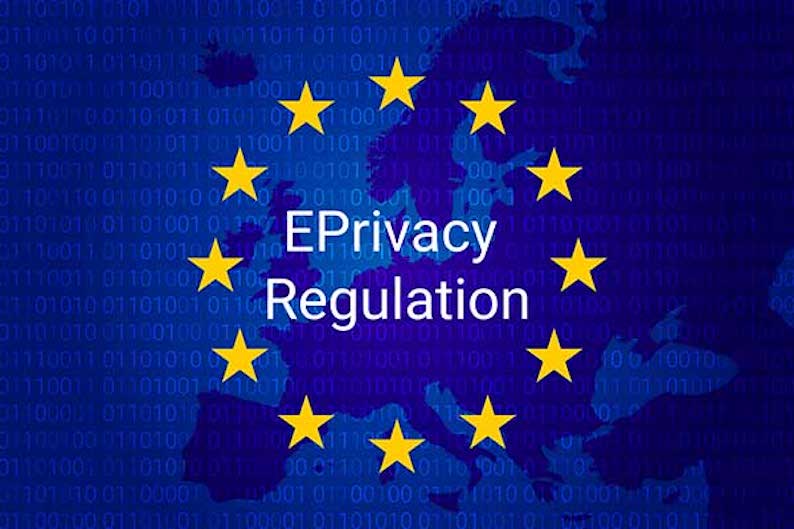doteditorial: Ethical Standards for Digital Technologies: Evolution Instead of Revolution?
Oliver Süme, Chair of the eco Association, looks at how the development of ethical guidelines for digitalization requires the active involvement of all stakeholders within and across societies around the globe.

© patpitchaya | istockphoto.com
This editorial is an adaptation of an article first published in German in the compendium “Digitale Ethik – Vertrauen in die digitale Welt” in 2019 by eco – Association of the Internet Industry.
The digital transformation of our social, political, and economic systems is initiating societal changes in regard to our communication, our patterns of interaction, our world of work, and our value chains, not to mention our values and norms. As a result, many new questions and challenges are arising for politics, for companies, and for each and every one of us. Digital technologies which find their applications in the areas of artificial intelligence, data processing, the Internet of Things, or social communication platforms are always so-called dual-use technologies – meaning that they can be both a blessing and a curse, can be used for benign purposes or abused to criminal ends. Given this, when it comes to digitalization, we also need to ask ourselves the questions: How do we want to make use of digital technologies? How do we want to shape digitalization? Or more concretely, on the premise of ethically-based good behavior: How do we guarantee a good life for everyone in the era of digital transformation?
These are questions that we will be coming back to often in dotmagazine throughout 2019. Digitalization is changing how we work, how we interact with each other on both social and professional levels, how we play, and how we learn. The fundamental topic of how to achieve an ethical digital transformation on the basis of multi-stakeholder consensus will resonate throughout dotmagazine issues and many activities of the eco Association in coming years.
Of course, in conjunction with ethical behavior, the question of responsibility always arises. Who is responsible for ensuring that digitalization remains a blessing and does not become a curse? Who defines ethical norms, guidelines for behavior, and ultimately legally binding framework conditions for the development and use of digital technologies?
As Europe’s largest association of Internet companies, we at eco see not only politics as having a duty – we are strongly convinced that ethical guidelines relating to digitalization can only be developed as part of a sustained dialog between society, politics, and companies within individual nations, and across borders worldwide.
With this in mind, the eco Association is proud to be a partner in what has become known as the “German Internet Institute”, the Weizenbaum Institute for the Networked Society. Founded in 2017, the institute brings together elements of the broader community – academia, the Internet industry, ethics groups, and governmental representatives – to study the impact of digitalization and accompany the evolution of our society. Co-founder Dr. Ina Schieferdecker talks to dotmagazine this month about the institute’s research focus and about education in a digital era. In order to harness the huge potential of digitalization for education, Dr. Schieferdecker emphasizes the importance not only of multi-stakeholder involvement in research, but also of pursuit of the UN’s Sustainable Development Goals. This point is also elaborated upon and case-studied by Joyce Dogniez of the Internet Society in her article, “Internet for Education: Key Considerations for Advancing Sustainable Development”.
Clearly, responsibility does not only lie in researching the impact of digital transformation. With their developments, products, and services, Internet and digital companies drive forward digital transformation and therefore certainly also shoulder part of the responsibility for answering the societal questions that arise. Oftentimes, companies have already taken on responsibility here, and have become active regardless of state regulations. An excellent example of this is the eco Complaints Office, which we have been operating very successfully under the auspices of eco for around 20 years. Together with Internet companies, and within a worldwide network, the Complaints Office works towards the rapid deletion of illegal Internet content such as child sexual abuse material (CSAM) or hate speech, and is a reliable partner in this for state-based law enforcement agencies (for further insights, read this month's article on “Regulated Self-Regulation That Works!”). A further example of self-imposed industry responsibility can be found in the Certified Senders Alliance (CSA), a whitelisting project for improving the quality of email marketing – taking the dual-use technology of email, and working towards the widespread adoption of voluntary quality standards from commercial emailing. You can learn more about the CSA and its work in the Alliance's article on “How Self-Regulation Can Help Increase the Quality of Commercial Emails”.
Another initiative worth mentioning is the European netID Foundation, which offers companies the chance of a neutral single sign-on for customers to log in to their various websites and platforms, as the Chairman of the Board of Trustees Jan Oetjen explains to the Director of the CSA, Julia Janssen-Holldiek, in interview. Here, we see an industry initiative that promotes transparency and enables users to have control of their data.
The advent of the GDPR is one legal initiative that has certainly focused attention on ethics in the digital arena, and the Internet industry in Europe and around the world has been hard at work over the last year or more to ensure compliance. Thomas Rickert from the eco Names & Numbers Forum reports on the continuing work at ICANN to bring the Whois in line with the European data protection regulation. Protection and privacy of user data is also the starting point for Vittorio Bertola from Open-Xchange, who concludes that, “we, the industry, have to make sure to use all our energies not just for our very important 2019 annual revenues, but also to build the world in which we would like to live, and lead the rest of society in that direction.”
This example brings me to a further important point in relation to ethics and digitalization: the question of the definition and enforcement of ethical norms. I have already indicated that a reform of our ethical behavioral norms can only be approached in the context of a process that involves the entire society. This is a topic that eco’s Honorary President, Michael Rotert, takes up in his examination of the potential for digital fundamental rights in “Digital Fundamental Rights and Internet Governance”. As Michael Rotert points out, what is needed is not to create a new set of rules, but rather to use the tools that Internet governance has given us to seek cross-border and global consensus on topics, and to incorporate “digital” into our existing framework of rights, ethics, and ideals.
But does enforcement also require a reform of our legal system? I am of the opinion that it will need to be much more a case of evolution rather than revolution. Even today, the Internet is no longer a legal vacuum – in spite of the fact that critics like to proclaim this regularly. In Europe in particular, we already have a tight legal framework for the Internet. In addition, many conflict cases in the digital world are solved with the legislation from the analog world, for example in the area of competition law. As a result, I am convinced that we do not need a flood of new legal framework conditions and regulations; instead, we must initially apply and, if necessary, adapt our existing legal culture to the new technologies.
It is my belief that digitalization will also make necessary a re-thinking of the possibilities for shaping the political system. Self-regulation, true governance rules, and ethics in digitalization can better capture complex, innovative, and future-oriented issues than rigid laws that are limited to retrospection can. This is the motivation for an ethical debate and ethical behavior of the Internet industry. As Henning Lesch makes clear in his article “Ethics in Digitalization”: “In order to shape the opportunities and potential of digital transformation positively, one of the central challenges will be whether we can succeed in transferring our societal ethics and the existing set of values to the digital era, and in further developing them.”
While ultimately, reform will require a whole-society approach, companies in the meantime cannot afford to stand still when it comes to adapting their culture to the opportunities and challenges of digitalization. As Sabine Zimmermann of X.O Group argues in her article “Value-based Management of a Company and Digital Transformation”, it is more important than ever for companies themselves to take the time to clarify their internal values and vision – and this process can naturally both be informed by and feed into the evolving multi-stakeholder debate.
With the eco Association’s Compendium “Digital Ethics: Trust in the Digital World” (available in the German language), which has just been published and which is reflected in some of the content of this and forthcoming issues of dotmagazine, I hope that we are able to contribute to the societal debate on ethical questions relating to digitalization, and in so doing, to further the dialog between civil society, politics, and companies.
Oliver Süme is a certified IT lawyer and partner at the European law firm Fieldfisher in Hamburg, Germany. He is an IT and technology law specialist with two decades of experience in the field. Oliver advises national and international clients of various sectors on their path to digitalization. Data protection, IT Security, and IT contracts are among his key areas, as are the legal impact of new technologies such as blockchain, Internet of Things, and Industry 4.0. He has a particular focus on advising international Life Science companies on data protection and GDPR compliance.
Oliver held the presidency of the European ISP association EuroISPA for five years until 2018, and in 2017 took over the role of Chair of the Board at eco – Association of the Internet Industry.






